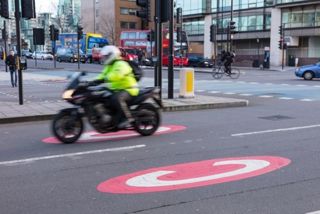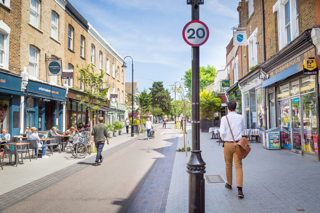Transport for London is making its final call for feedback on proposals to introduce the world’s first Ultra Low Emission Zone (ULEZ) in the capital on 7 September 2020, as the public consultation enters its final weeks.
The Mayor and Transport for London (TfL) have been seeking the views of everyone who lives, works or travels in the capital on the proposed scheme which would significantly improve air quality and in turn the health of Londoners.
The ULEZ consultation runs until Friday 9 January 2015 and is available online at www.tfl.gov.uk/ultra-low-emission-zone.
The groundbreaking proposals would require all vehicles travelling within the Congestion Charge zone to meet new emission standards and would be in operation 24 hours a day, seven days a week. Many vehicles would already meet these standards in 2020, however by introducing this requirement next year the Mayor and TfL aim to accelerate the take up of low emission vehicles and stimulate the low emission vehicle market. The ULEZ will also ensure London’s air quality improves more quickly, making the capital a more pleasant place to live and work, and encourage the use of more sustainable forms of transport.
The ULEZ is projected to halve emissions of nitrogen oxide (NOx) and particulate matter (PM10) from vehicle exhausts. This means more than 80 per cent of central London is expected to meet the nitrogen dioxide (NO2) annual legal limits in 2020. The ULEZ would also lead to a significant reduction in the number of people living in areas of poor air quality (where levels of NO2 exceed legal limits) – by 74 per cent in central London, 51 per cent in inner London and 43 per cent in outer London.
Boris Johnson, Mayor of London, said: “Introducing the world’s first Ultra Low Emission Zone is an essential measure to improve London’s air quality and reduce NO2 . Safeguarding Londoners’ health and well-being is a top priority for my administration. I understand that people need adequate time to switch to greener vehicles and help is at hand for those who will be hardest hit, but let’s be clear, we need to make these important changes ASAP to continue to improve Londoners’ quality of life and give everyone who lives in or visits the city the cleanest possible air to breathe.”
The ULEZ proposals would require vehicles travelling in central London to meet the following emissions standards, or pay a daily charge:
· Cars and small vans – Euro 6 for diesel engines (registered from 1 September 2015 so 5 years old or less in 2020) and Euro 4 for petrol engines (registered from 1 January 2006 so 14 years old or less in 2020). Non-compliant vehicles could still drive in the zone but they would be required to pay a daily charge of £12.50;
· Large vans and minibuses – Euro 6 for diesel engines (registered from 1 September 2016 so 4 years old or less in 2020) and Euro 4 for petrol engines (registered from 1 January 2007 so 13 years old or less in 2020). Non-compliant vehicles would be required to pay a daily charge of £12.50;
· Heavy goods vehicles, buses and coaches – Euro VI (registered from 1 January 2014 so 6 years old or less in 2020). Non- compliant vehicles would be required to pay a daily charge of £100;
· Motorcycles and similar vehicles – Euro 3 (registered from 1 July 2007 so 13 years old or less in 2020). Non-compliant vehicles would be required to pay a daily charge of £12.50.
As part of the ULEZ proposal, TfL is working to reduce emissions from its buses alongside taxis and private hire vehicles and to increase the number of zero emission capable vehicles. This will create demonstrator fleets in London, boost industry sales and lead the transition towards this technology.
rom 2018, it is proposed there will be a new requirement for all taxis and new private hire vehicles presented for licensing in the capital for the first time to be zero emission capable. Private hire vehicles would also be subject to the ULEZ standards in central London just like other cars and vans (and therefore liable for the charge if they don’t meet the emissions standards).
Taxis will be the second largest contributor to NOx and the largest contributor to PM10 emissions from road transport in central London in 2020. The ULEZ proposes to reduce the London-wide age limit for non zero emission capable taxis from 15 years to 10 years. This would substantially reduce emissions from these vehicles across London (by 45 per cent for NOx and 71 per cent for PM10) and help accelerate the take up of new zero emission capable taxis.
In considering the impact of the reduced taxi age limit, the Mayor and TfL are proposing a specific fund to assist taxi drivers to replace their vehicles. In addition, TfL has been in regular dialogue with the Office for Low Emission Vehicles to ensure their new £500m funding allocation specifically supports taxi and PHV drivers to purchase zero emission capable vehicles, as well as supporting a fund for on-street rapid charging infrastructure.



















Bob the Engineer - 31/12/2014 16:20
I just feel sorry for all my engineer colleagues down there that have to visit customers in these zones with a 70kg complement of equipment and spare parts on board so public transport is impossible, yet they need a vehicle that can also cover the rest of the country so a short range electric milk-float car is not an option either. The real answer to London's pollution is to solve the ever spiralling over population addiction in the South East. Its become a self fuelling nuclear reactor with more people constantly needed to service the ever growing concentration in a runaway loop. The only policy Boris has is keep ramping up the attempt to price people to just go away. Companies need to see the trees for the wood - in fact the employees would enjoy seeing some trees instead of the A40 - its a myth there are only capable workers within the South East. Set your business up somewhere that needs the work and investment and you will be rewarded with a quality and lower cost of life you never dreamt possible. Don't believe the myth that the M25 is a giant antenna for the internet, we can get the internet and telephones even up here in the Midlands where £500K will not only get you a house with room for a pony but the pony or two as well. Worried about skills shortage? the saving in real estate cost alone would fund a comprehensive training and/or apprentice scheme - instead of competing for staff that expect high pay to cover high living costs, make your own ideally skilled employees to order! In 2015 there is just no tangible reason to be SE centric. The policies so far have to keep being tinkered with as they can't ever work. The truly unnecessary drivers, the single occupancy with just their Apple laptops too sniffy to do public transport will always dodge restrictions with their 4 litre 'zero emission' hybrid Lexus with impunity whilst poor Joe Bloggs of Acme Healthcare ltd in his Mondeo Estate trying to go about his business and install a new defibrillator at St. Thomas gets hammered for it. Ultimately even if people travel only by goat pulled sledges emitting 4g/km if the goats have been fed low sulphur hay, enough of them will still make the air bad. Time to face up to the real issue and create work and opportunity elsewhere. Happy New Year.